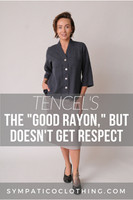Tencel's the "good rayon," but doesn't get respect
Posted by Rose on 8th Sep 2021
This eco-friendly fiber is a key element in creating Sympatico’s sustainable lineup of hemp and Tencel clothing for women.
Even though it’s been around since the 1970s, I find Tencel is far less well known than other modern fibers. And that’s a shame, given its sustainable, Earth-friendly production and wonderful look and feel.
Our Tuxedo Top and Curved Skirt drape well thanks to their Tencel content while the hemp in the fabric blend offers structure.
In the environmental press, Tencel doesn’t always get the respect or distinction it deserves. A 2017 The Guardian article spells out the litany of environmental and human-health harms caused by conventional viscose production. (That’s the viscose rayon found in lots of fast fashion today.) But like many similar articles I’ve read, it fails to mention Tencel, another viscose fiber, but one made in a sustainable, closed-loop system.
Though fast-fashion’s viscose and Tencel both come from soft woods (eucalyptus for Tencel and pine and birch for viscose), that's environmentally where they part company.
As The Guardian article details, conventional viscose production, with its intensive use of toxic chemicals, is wreaking havoc on water supplies and human health. A Changing Markets Foundation study of 10 viscose production sites in India, China and Indonesia found severe environmental damage at every one. Air and water pollution are severely impacting the health of workers and people who live around viscose plants. In some cases, old-growth forests are exploited for their cellulose to make paper and fiber — a practice prohibited in making Tencel, which uses only farmed trees.
That’s why Tencel is such good news
As I explain in Why Tencel clothes make sense, I use Tencel, blended with hemp, because its entire production process is transparent and sustainable. The wood is grown sustainably and the non-toxic organic solvents used to make Tencel fiber are recycled with a 99.5% recovery rate. The remaining emissions are processed with algae-based agents that allow them to be safely returned to the environment. As a result, Tencel fabric has earned Oeko Tex 100 certification and the European Community Eco-label flower for products and services with reduced environmental impacts.
Tencel’s sustainability continues beyond its original life. Its fibers can be recycled or composted. I’ve successfully fed Sympatico fabric scraps to my redworm colonies who in time transform them into castings. My gardens love the stuff!
Aside from its unsurpassed sustainability, Tencel is a brilliant component in eco-friendly fabric blends. When blended with hemp, for example, it imparts a supple drape and feel. That's why I use this blend exclusively to handcraft the Sympatico lineup of Tops, Skirts, and Pants.
Share:







